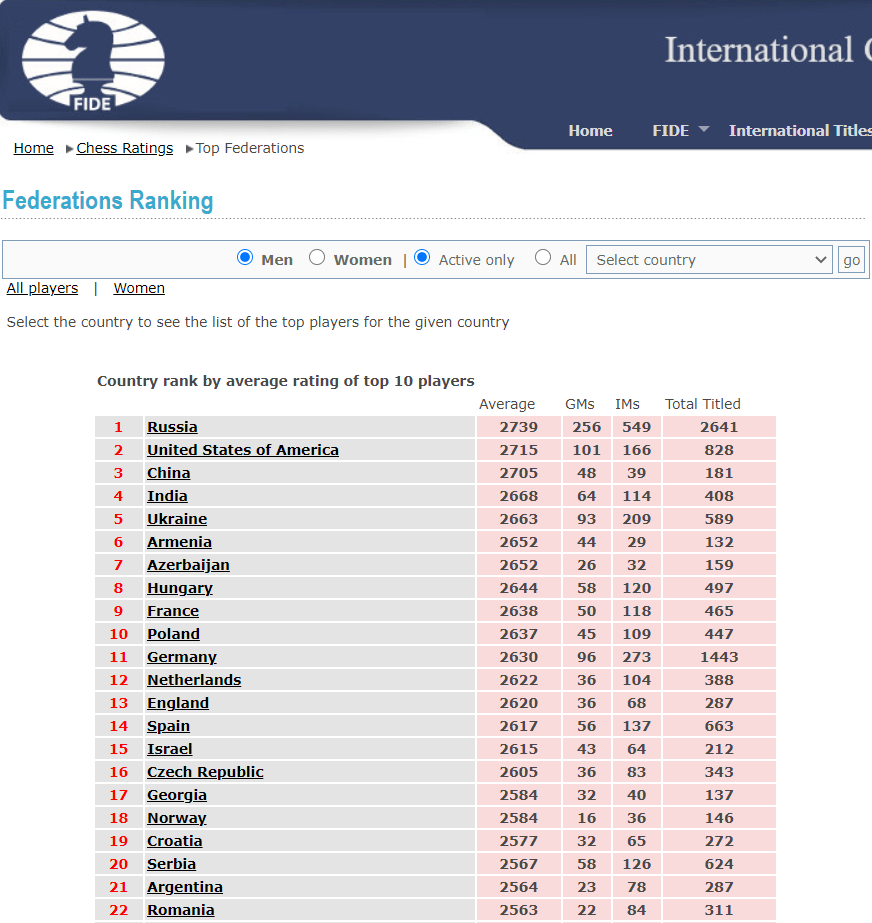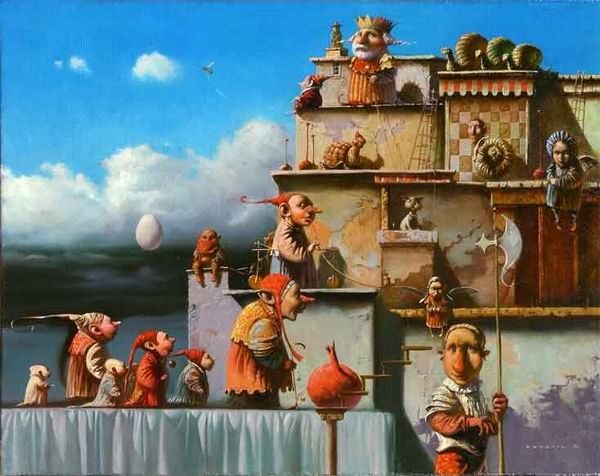
Top 5 Chess Nations: 1.RUS, 2.SRB, 3.USA, 4.HUN, 5.ISL (Check 5 Criteria Below)
Is the true chess strength of a nation lying in the number of top Grandmasters, or perhaps in how strong the Average Joe is?
To weigh the strength of nation's chess elite, we can go to the FIDE site where all information of titled, rated, and registered players is readily available. Here is FIDE ranking of its member federations based on the average rating of top ten players.

In his article What is the best chess nation? @Pete also uses this elitist approach, "Perhaps the best measure of a nation's chess strength is how many super-grandmasters it brings to the chessboard—grandmasters rated 2700 or better, who play the highest level of human chess."
I strongly disagree. Chess is not the game of the elite and for the elite. It is a highly popular game and belongs to everyone. A 2012 survey found that "chess players make up one of the largest communities in the world: 600 million adults play chess regularly".
So it would be nice to know how many players per country there are. @Forked_again (in a comment on my The world's most chessly nation is... Iceland blog) says, "we would be interested to know more basic info such as the percentage of people who say they play chess [in the population]; play chess daily, weekly etc.; percentage who have a chess board set up in their home etc." He adds, "Chess is a game for the masses. It's not all about the masters."
Susan Polgar once posted on her blog that 40 million people play chess in the US which is more than 10 percent, something close to what the 2012 survey found globally. This opens further questions, one of them being what proportion of these "players" have learned the moves only, where their chess expertise sadly ends?
There are still other things that may affect our perspective as we are trying to identify the most chessian nations. How about chess tradition and cultural background that has been developed and cherished in a country? For example, Iceland is known as a country with a strong chess tradition where almost everyone is playing. On the other hand, China is the third in the above FIDE ranking, yet the base of players is very narrow as the country mostly plays XiangQi, the Chinese version of chess.
So again, the question remains whether it is the performance of country's top Grandmasters, or perhaps it is John Doe's proficiency, aptitude and talent that matter more for the nominations of the most chessian nations? or maybe they both do?
Wednesday I posted a blog showing the rankings of chess nations. Instead of using top ten, the number of all rated players per capita was used. The approach of using the relative number of players per capita was an attempt to look away from the mere peak of the players' iceberg, away from the chess elite, and look more toward how strong in a wider sense the country's chess is. It is sort of measuring the "density" of all good players the country has.
In order to make proponents of the top-elite-only-matters happy, let's make an act of reconciliation![]()
So here's the deal. How about we make a list of most chessian states by using the following Criteria,
- Total number of Grandmasters
- Total number of GMs per 1 million pop
- Average rating of top ten GMs
- Total number of all Titled players
- Total of all Titled players per 1 million pop
.
The criteria ##1,3,4 are taking into account the absolute numbers. Yet, the brute numbers may bounce around in a misleading way as far as the country size, or the overall popularity and chess culture are concerned. The ##2-5 are balancing the absolute numbers with the country size, not without due merit to smaller nations. Other elements, like how much chess is respected, or the country's chess culture level and history remain intangible in the absence of a measuring stick.
Would these five criteria then better serve our purpose to identify the nations most keen and captivated by chess? I do believe so. Not perfect, but in my view much better than the elitist Super Grandmasters-only method.
The countries will be given points from 10 (highest) to 1 (lowest) as per each criteria above. The maximum number of points per country is 50.
There's also some restrictions I imposed as to who can really show up in the list. For example, FIDE tweeted rankings based on the the number of Grandmasters per capita showing Monaco and Andorra with two GMs each topping the list. Which absolutely makes no sense.
To avoid these statistical deviations I limited the scope of our "study" to the countries with an average top GM rating over 2,500 only. Alas, this approach knocked out my ancestral country of Montenegro with 620,000 population and 6 GMs off the list, even though it maintains a solid third-best ranking in the GMs per capita category (or an extrapolated 9.7 to be exact). Yet, the average GM top ten rating of Montenegro is 2,453 and so below the 2,500 admission limit.
I still do keep Iceland in the game even though the average rating of the top ten players dropped below 2,500 mark in the past years. How can we ignore Iceland, the country that by some indicators IS the most chessian country in the world?
Ok, let's now go to the numbers. Here are the most chessian nations in the world (based on the 5 criteria above; right click on the image, then select 'Open image in new tab' for a bigger view).
.
Table 1: Best Chess Nations in the World (per Criteria 1-5)

.
Do the rankings make sense? I think they do. Russia has long been considered a chess powerhouse. Somewhat on decline, but still going strong. Serbia, surprisingly, for most of you, is in the second place. Well, Serbia was part of former Yugoslavia that was considered as the second-strongest chess nation in the world of the second half of 20th century. Competing very closely for that position with Hungary though (Hungary found herself in the fourth position this year, down one place from 2011). Serbia has been in a political, social and economic crisis for some thirty years now and long gone are the times when her top players Gligoric, Ivkov, Ljubojevic, Velimirovic, Matulovic, Lazarevic used to be in action. Yet, it is fascinating to see such a small country still getting points per four criteria, not only for the per capita numbers (the 4th position in category #2 and 2nd per criteria #5), but also in the absolute numbers of GMs and the all Titled players (sharing 6th and 5th place respectively!).
There is another interesting fact about the Balkan nation (7 mill. pop). She has 58 GMs compared to 101 in the US (330 mill. pop). But in fact, Serbia has more native GMs (not the top level, to be sure) than the US (keep in mind that about half of American GMs have been naturalized, thus not grown in chess locally).
Hungary, a nation with a strong tradition, is the only one with points earned in all five categories. It is a very telling indicator of her chess strength on both sides of the players' criteria spectrum.
The fifth place is taken by Iceland. A country with a great tradition that well deserves its high position. A small, but big chess nation where our game has been long held in high regard over centuries. The Norwegian clergyman Peder Claussøn Friis (1545-1614) gave a description of Iceland in 1580. He noticed that the "Icelanders knew a great deal about chess & law."
.
If we apply only criteria 1-3, and then 3-5, the rankings are a bit different,
Table 2: Best Chess Nations. Grandmasters-only

.
Table 3: Best Chess Nations. All-Titled Players

Finally, it would be interesting to see how this year's rankings compare to the ones I made back in 2011. The most dramatic change has seen the US moving upward four places.
.
Table 4: Best Chess Nations (per Criteria 1-5) in 2011

.
What criteria would you apply to determine the Best chess nations?
The British chess educator Richard James @falseknight (minichess.uk), Twitter: chesstutor) whose pupils were GMs Luke McShane and Jonathan Rowson thinks we should measure chess enjoyment and culture: number of proficient players, not number of very strong players. He prefers the number of 2000+ (or even 1500+) per capita as a measurement of top chess nations. Iceland, the most chessian country blog shows the rankings using the number of all rated players that is closest to James' preference (some rated players are below 1500 rating).
I'm also preparing a blog on the best female chess nations. Not quite clear what should be the country's average top ten admission rating (like men's 2,500 FIDE for the criteria #3 above).
Appreciate your thoughts. You all take care.
.
.
